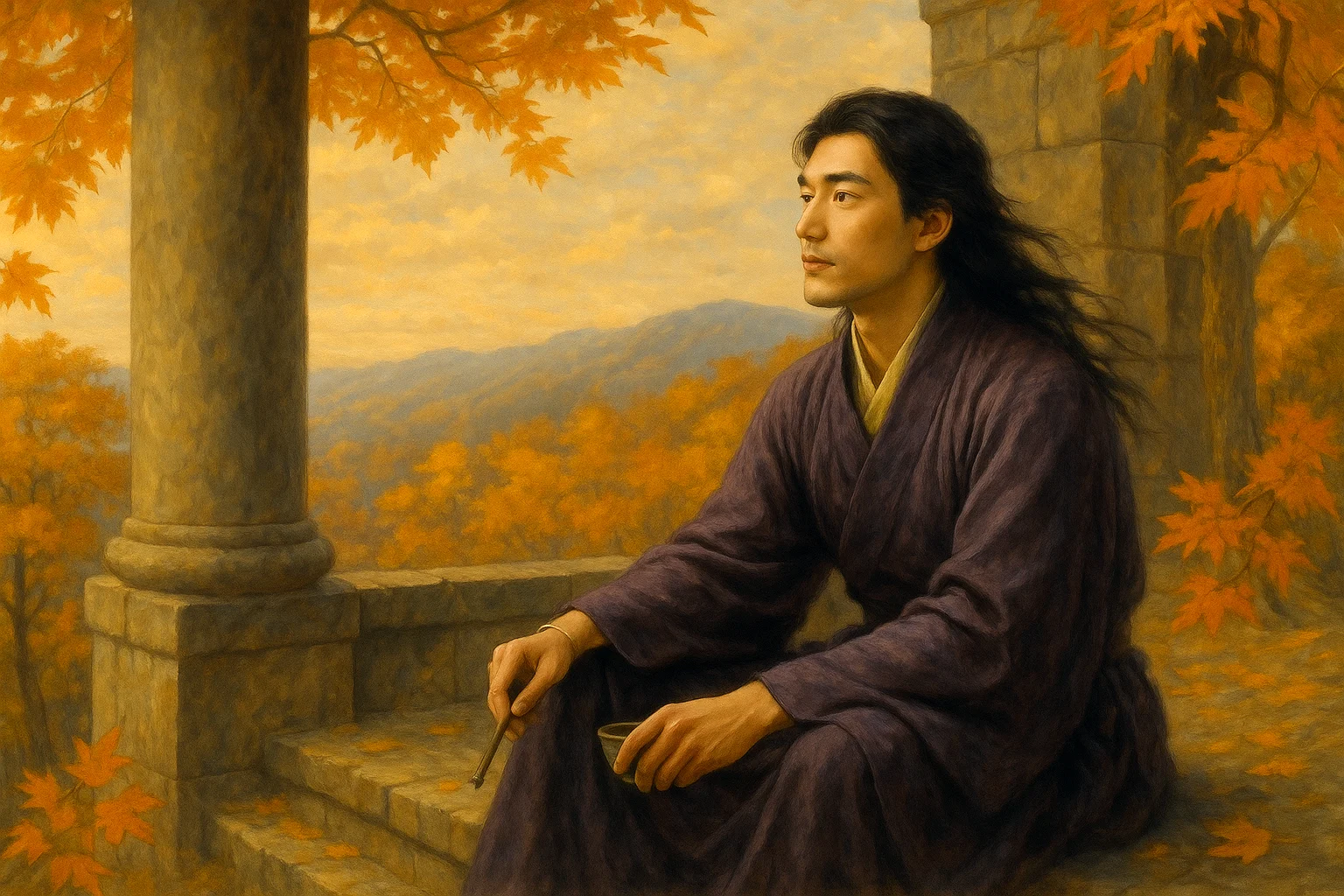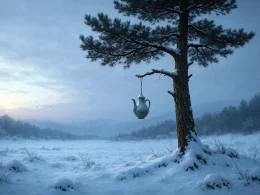The world once praised Liu Zhen's noble art,
His odes rang with wind-elegance, set apart.
You came, yet saw blank years slip past,
Return unnamed - how long will it last?
Far and near, twilight first descends,
Mountains and streams gleam with half-snowed ends.
Vainly I hold memorial drafts in hand,
Turning to gaze where palace lanterns stand.
Original Poem
「送李端」
耿玮
世上许刘桢,洋洋风雅声。
客来空改岁,归去未成名。
远近天初暮,关河雪半晴。
空怀谏书在,回首恋承明。
Interpretation
This poem was composed by Geng Wei as a farewell to his friend Li Duan, a renowned Mid-Tang poet and fellow member of the "Ten Literary Masters of the Dali Era." The two were not only poetic companions but also kindred spirits. During an era when imperial examinations were fiercely competitive and official careers often blocked, many talented scholars found their ambitions thwarted. In these verses, Geng Wei lavishly praises Li Duan's literary gifts while lamenting his unrecognized talents and expressing profound sympathy for his friend's wandering journey. The poem radiates sincere emotion and deep reflection, conveying both regret for a friend's unrealized potential and subtle parallels to the poet's own circumstances.
First Couplet: "世上许刘桢,洋洋风雅声。"
Shì shàng xǔ Liú Zhēn, yáng yáng fēng yǎ shēng.
The world acclaims you as Liu Zhen reborn,
Your refined verses like a ringing wind-horn.
The opening lines exalt Li Duan's literary prowess by comparing him to Liu Zhen, one of the Seven Scholars of the Jian'an period - a supreme compliment. "Ringing wind-horn" (洋洋风雅声) describes not only the far-reaching elegance of his poetry but also the poet's genuine admiration and regret. This couplet establishes the dual tones of lyrical warmth and lament for unrecognized talent that permeate the entire poem.
Second Couplet: "客来空改岁,归去未成名。"
Kè lái kōng gǎi suì, guī qù wèi chéng míng.
Your wanderer's years slip by with naught to show,
Returning still unnamed, your gifts unknown.
Here emerges Li Duan's plight as an itinerant scholar. "Slip by with naught" (空改岁) sighs over years spent without achievement; "unnamed" (未成名) directly states his friend's thwarted ambitions while implying the poet's own resentment toward the era's injustices. The mood shifts from praise to melancholy, heavy with the pain of rootless existence and bureaucratic barriers.
Third Couplet: "远近天初暮,关河雪半晴。"
Yuǎn jìn tiān chū mù, guān hé xuě bàn qíng.
Dusk veils the near and far in equal measure,
Where mountain passes gleam with half-melted treasure.
The scene now turns to the actual farewell setting: twilight's dim light and lingering snow mirror the parting's chill sorrow. "Near and far" (远近) and "mountain passes" (关河) describe both the vast landscape and the long journey ahead; "half-melted" (半晴) adds a desolate touch, rendering the farewell scene profoundly still and boundless.
Fourth Couplet: "空怀谏书在,回首恋承明。"
Kōng huái jiàn shū zài, huí shǒu liàn chéng míng.
Your memorial drafts lie useless in your hold,
Yet still you glance back toward the Palace of Gold.
The finale highlights Li Duan's unfulfilled political aspirations through "memorial drafts" (谏书) - proposals that never reached the throne. "Glance back" (回首恋) reveals his lingering attachment to the Chengming Hall, symbol of imperial service. The contrast between "useless" (空怀) and "glance back" (恋) merges unrealized ambitions with unbroken attachment, making this both a farewell to a friend and a reflection of the poet's own predicament. The closing image vibrates between resignation and persistent longing.
Holistic Appreciation
Through his portrayal of Li Duan's literary brilliance, struggles, and eventual retreat, Geng Wei reflects the shared plight of scholars during the Dali era (766–779 CE). The poem moves from "surpassing Liu Zhen" to "idly clutching memorial drafts"—praising Li Duan's enduring reputation while lamenting the thwarted aspirations of intellectuals to serve their country. With concise and understated language, the poet quietly captures the melancholy of a gifted scholar and the sorrow of parting between kindred spirits, revealing profound friendship and deep contemplation. The third couplet's "snow at dusk over mountain passes" serves both as a literal scene and a metaphor for the pain of separation and the hardships of official life, while the final couplet elevates the poem to a meditation on "grieving for the times and the lost Way," leaving a lasting, resonant emotional impact.
Artistic Merits
- Sincere Emotion, Blending Self-Reflection and Tribute: The poem expresses admiration for a friend and the sorrow of farewell, while also conveying the poet's own frustration over unrecognized talent.
- Restrained and Subtle, Emotion Embodied in Scenery: The poet uses "dusk snow on distant mountains" to amplify the mood, intensifying the desolation of parting.
- Elegant Allusions, Rich Imagery: References like "surpassing Liu Zhen," "memorial drafts," and "Chenming Gate" deepen the poem's historical and cultural layers.
- Precise Structure, Natural Progression: The four couplets move seamlessly through praise, lament, scenery, and aspiration, creating a clear and cohesive rhythm.
Insights
True friendship is not merely a ceremonial farewell but a meeting of minds and shared ideals. Beyond its refined elegance, the poem grapples with the realities of political life and the unfulfilled ambitions of scholars, embodying the Confucian ideal of "using literature to uphold the Way." Today, this spirit—persevering through the tension between talent and fate, holding fast to conviction in silence—remains a timeless force.
About the poet

Geng Wei (耿湋, dates unknown), a Tang dynasty poet from Yongji, Shanxi, was among the "Ten Great Talents of the Dali Era." Renowned for his mastery of five-character regulated verse, his poetry is distinguished by its economical diction and tranquil imagery. While the prevailing style of Dali poetry tended toward austerity and desolation, Geng Wei developed a distinctive voice marked by understated naturalism.












